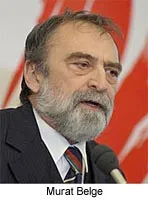New York, June 9, 2006—The Committee to Protect Journalists welcomes the acquittal of a Turkish newspaper columnist by an Istanbul court on Thursday, but remains deeply concerned by the ongoing criminal prosecution of journalists in Turkey.
Murat Belge of the daily Radikal was acquitted on charges of attempting to influence the outcome of judicial proceedings by challenging a court-ordered ban last year on an academic conference about the killing of Armenians under the Ottoman Empire. Armenians call the killings from 1915 to 1917 the first genocide of the 20th century, a characterization that Turkey rejects.
Belge was one of five journalists charged under Article 288 of the penal code for writing about the conference ban. An Istanbul court dismissed charges against the other four in April because the prosecution had failed to bring indictments within the deadline allowed by the law, but Belge’s case went ahead.
The Turkish press freedom organization Bia said an indictment for one of Belge’s articles was dropped because it had exceeded the statue of limitations, and he was acquitted of charges stemming from other articles about the ban.
“We are relieved that the court has acquitted our colleague Murat Belge of these spurious charges,” CPJ Executive Director Ann Cooper said. “Nevertheless, prosecutors continue to pursue journalists who write on topics that some Turkish nationalists consider taboo. We call on the government to send a clear signal that Turkey is committed to upholding press freedom and the values of the European Union which it aspires to join.”
The prosecutor who brought the indictment at the prompting of the nationalist Turkish Union of Lawyers is still pursuing charges against all five journalists in the Court of Appeals, according to Bia.
In the past year, 17 journalists who discussed human rights cases, the Armenian conference ban case, and torture cases, have been charged with attempting to influence court decisions under Article 288 and other press law provisions, according to Bia.
Read more on Turkey.
